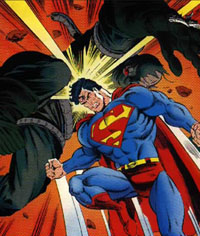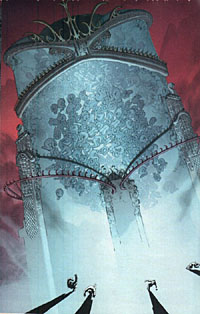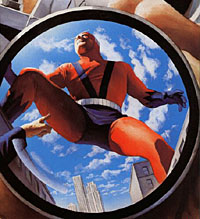>> Triple A: Urban Legend
>> Letter from the Editors
More...

JOHNSTON: Sense of wonder. What the hell does that mean?
WATSON: It's a term you hear bandied around a lot in comics, especially but not exclusively with regard to superhero comics. What comics do really well is either a sense of wonder or small autobiographical stuff. It's a medium of extremes. I think, Andrew, that you're the one that's suggested that to me on a couple of occasions.
WHEELER: Yeah, maybe. I'll say anything with a couple of tequilas in me.
WATSON: Comics do two things really well; stuff that requires the sense of wonder, and stuff that is much smaller and more autobiographical. And ne'er the twain shall meet.
WHEELER: The intimacy of the panel, the expanse of the page.
WATSON: How long have you been polishing that phrase?
WHEELER: It just came to me! I'm damn good, me.
WATSON: I suspect you of having polished it.
JOHNSTON: That's interesting. So where does that put something like PREACHER?
WATSON: Well, this is it. I'm interested to see what we regard as the sense of wonder. How do we achieve it? Is he right, is it a medium of extremes?
WHEELER: I'm not convinced this is something I came up with.
JOHNSTON: Well, you can defend it anyway. Isn't it fair to say that, with regard to superhero comics, anyway, the sense of wonder is actually a sense of aspiration or even jealousy. What we're actually talking about are the moments where someone does something incredibly cool and the reader thinks, 'God, I wish I could do that', or, 'I wish I was that person'.
 WATSON: With very few exceptions it seems to me the sense of wonder in superhero comics is meant to be provided by violence. Superman v Doomsday, for example, 'The Death Of Superman', you're talking about a sense of wonder as he saves the city at the expense of his own life. Basically by having a big fight for about three issues. I don't think this does provide a sense of wonder.
WATSON: With very few exceptions it seems to me the sense of wonder in superhero comics is meant to be provided by violence. Superman v Doomsday, for example, 'The Death Of Superman', you're talking about a sense of wonder as he saves the city at the expense of his own life. Basically by having a big fight for about three issues. I don't think this does provide a sense of wonder.
JOHNSTON: More a sense of boredom, as I recall.
WATSON: Someone was clearly aiming for a sense of wonder, and delivering crap.
JOHNSTON: That was down to the execution. So does violence provide a sense of wonder?
WATSON: Grant Morrison in his JLA - not regarded as his strongest work - there are two sequences that really spring to mind for me. There's a sequence when Superman moves the moon - the bad guys move the moon out of orbit, and he moves it back by turning himself into a giant magnet. I know it sounds absurd, but there is a page of Superman between two jury-rigged electrodes, putting the moon back in orbit. The other one is one that doesn't work for me, and it's playing back to violence. In one issue he had been worrying about living up to the myth of Superman, and he winds up the only person who can stand up a very angry archangel. There's a shot of them fighting, a wrestling style shot, and you could see them straining, and Green Lantern makes a comment, "He's wrestling an archangel and he's wondering if he can live up to the myth?" But there's no sense of wonder on that page.
JOHNSTON: So that's an example of violence that didn't provide a sense of wonder, and one example of a rescue effort that did. With regards to Superman, in the comics and the movies, I've always thought the rescue efforts inspire more of a sense of wonder, but that could just be due to the novelty of them, because they always have to come up with some different way for Superman to save the day other than just flying around the Earth.
WHEELER: Steve Dillon and Garth Ennis's PUNISHER works because of the violence.
WATSON: But you're not being asked to go for the sense of wonder, you're being asked to laugh at ludicrous violence.
WHEELER: It's still going for the reaction shot, though. Are we saying wonder is the only reaction...
'It seems the sense of wonder in superhero comics is provided by violence.' WATSON: No, my question is, why is the sense of wonder the thing creators are always aiming at, and why is it they so often miss?
JOHNSTON: It is the Holy Grail for a lot of creators.
WHEELER: I don't know how consciously most creators do aim for it. I don't know if the awareness of it is that broad. I think it may have been there back in the day. Golden Age creators went for it, but I don't think Silver Age creators wanted it.
JOHNSTON: You don't think Joe Casey, for example...
WHEELER: There are exceptions, and Joe Casey is someone that came to mind when you were talking about Superman moving the moon. MR MAJESTIC #1 has the hero realigning the entire solar system so that a cosmic God will think it's a different solar system and go past.
WATSON: I've never read MR MAJESTIC #1 and I've no idea how it was executed, but it sounds like that goes over the top.
WHEELER: Well, the reason it works is that because he was so busy realigning the universe, he was out of circulation for twenty years and couldn't be on Earth saving the world. The series begins with him coming back to Earth after setting the universe back to normal again and saying, now I have time to fix the world.
JOHNSTON: Casey is certainly a writer who strives for... I wouldn't say a sense of wonder, I'd say a sense of cool. But it is the same sort of thing; he wants you to go wow.
WHEELER: Morrison wants you to marvel at the idea and the density of the ideas, and it's not the visuals. While his books can contain striking visuals, I don't think it's the visuals that are intended to be remarkable. A sense of wonder doesn't have to be a visual thing.
 JOHNSTON: PLANETARY I think has a very strong sense of that cool mysteriousness. It's an essential part of the comic. What does it have, other than enigma?
JOHNSTON: PLANETARY I think has a very strong sense of that cool mysteriousness. It's an essential part of the comic. What does it have, other than enigma?
WATSON: Splash pages! But I think the splash pages are just a technique, in the same way that a film soundtrack is used, to say, "This is what you should be feeling now".
JOHNSTON: It does help when you have an artist as insanely detailed and baroque as John Cassiday. So is the sense of wonder in PLANETARY because of the visuals, or the way it's written, or a synergy of both, or are we being completely duped, or what?
WHEELER: It's the subject matter.
WATSON: PLANETARY is not afraid to say, here's the one idea I'm going to play with today.
WHEELER: It's revelling very consciously in a subject matter designed to evoke wonder. It's taking what is considered wonderful and has become wonderful in pop culture iconography and playing with that. If your idea is to achieve a sense of mud, diving into a pigsty is the perfect place to do it. A pigsty full of wonderful mud, that's PLANETARY.
WATSON: You're really stretching for that metaphor.
WHEELER: I may have overextended that one.
WATSON: Oddly enough, PLANETARY is one place where violence can evoke a sense of wonder.
WHEELER: In the original AUTHORITY it does. Even if it's just Jack Hawksmoor punching through someone's skull.
'The sense of wonder is the Holy Grail for a lot of creators.' JOHNSTON: Can I just ask; Why are the comics that PLANETARY is pastiching not also filled with this sense of wonder?
WHEELER: It's not pastiching comics when it achieves that. Or when it is, it's the Golden Age ones, where they were aiming for a sense of wonder. It doesn't tend to pastiche the modern so much. The one 'modern' issue, the Vertigo issue, was the weakest issue of the series.
JOHNSTON: Maybe it's an element of its time, then, because I've never got a sense of wonder off the old Golden Age comics.
WHEELER: No, it was part of its time. Back then these ideas were new and wonderful. There would have been something wonderful about these ideas when they weren't so familiar.
WATSON: It occurs to me, Doc Savage, or Tom Strong in Alan Moore's reincarnation of the science hero, doesn't actually possess any dazzling superhuman abilities. He's basically Batman. Yet you do get a sense of wonder, mostly because of the idea he's fighting today, the crazy thing the creator has come up with that this 'peak condition' human has to defeat.
JOHNSTON: Of all the top, long-running superheroes it's probably Batman that inspires the most sense of wonder, possibly through enigma.
WATSON: The only way I've seen Batman strike a sense of wonder is in the way Frankenstein's monster achieves a sense of wonder. That gothic edge.
JOHNSTON: That's what I mean, It seems to hit that note.
'A sense of wonder doesn't have to be a visual thing.' WATSON: In the Batman comics I've read, I've only seen it in places. I think ARKHAM ASYLUM has it.
JOHNSTON: Ah, no, I think ARKHAM ASYLUM does a good job of destroying any sense of wonder you might have about Batman.
WATSON: There is a sense of wonder there, for me, in the idea that Batman is just as mad as the people he fights, yet he does good.
JOHNSTON: I only mention Batman because you compared him to Tom Strong. I don't really get a sense of wonder from either of those comics, but I know a lot of their readers do.
WHEELER: I don't see the character of Batman as wondrous, but there is a tremendous Alice in Wonderland sense to Batman's Gotham City.
JOHNSTON: Maybe in the 60s.
WHEELER: Even away from that sense of camp. It's a land of demons and ghouls - or it ought to be, if it's played well. But is that wonder? I think it's fascination.
WATSON: Wonder is not necessarily an 'ooh' sensation. Awe and wonder are too closely linked in my mind to be separated, but you're not always in awe of something you like.
JOHNSTON: So we can't redefine a sense of wonder as a sense of aspiration, because it can be a sense of awe as well?
WATSON: I think it's something you're meant to stand back and say 'ooh' at, but it can be said in fear.
JOHNSTON: Is it to do with scale, at all?
 WATSON: I think there are times when people have tried to simplify it down to that, and MARVELS springs to mind, especially that one image they used to trail the damn thing, that shot of Giant Man looming above New York. MARVELS never worked for me.
WATSON: I think there are times when people have tried to simplify it down to that, and MARVELS springs to mind, especially that one image they used to trail the damn thing, that shot of Giant Man looming above New York. MARVELS never worked for me.
WHEELER: Oh, I quite liked it. The thing is, the reason a sense of scale is such a popular way of achieving a sense of wonder is because there's no budget in comics. I know that's not factually true, and I'm sure accountants the world over would scream at me for suggesting it. What I mean is, there's no budgetary restriction on achieving a sense of scale.
JOHNSTON: Metaphorically, it is about scale, isn't it? Even if you're not talking literally about Giant Man, metaphorically you're talking about things bigger than ourselves.
WHEELER: It's what stands out from the mundane. Which is why in a mundane story, you need to stay mundane. A slice of life story doesn't want to be fantastic. Although that puts me in mind of Paul Thomas Anderson's movie MAGNOLIA, where it's about the mundane and suddenly there's this fantastical shared moment and the whole thing shifts. The sense of scale there is a juxtaposition. Generally in a small-scale story, you wouldn't go for that moment.
JOHNSTON: And it's the single element in the entire movie that makes you go 'ooh'.
WHEELER: In movies like THE ICE STORM or THE OPPOSITE OF SEX, you don't have that single moment. It has to be fantasy. PLEASANTVILLE, a movie that deals in similar themes, has a sense of fantasy, and it does have the wow moment, when the tree catches fire.
JOHNSTON: Sure, slice of life stuff generally doesn't have that moment, and doesn't want it or need it, because it does bring it out of the realistic.
WHEELER: You don't get that moment in any of Andi Watson's comics. Jason Lutes's work, Ed Brubaker's autobiographical comic, Adrian Tomine's comics.
WATSON: I was thinking about Chynna Clugston-Major's BLUE MONDAY, where it suddenly went wrong for me when she introduced that otter - sorry, pooka. It's a comedy set in our world, a comedy that more or less could actually happen...
JOHNSTON: Only in so much as something like AMERICAN PIE is set in our world. Which is to say, not really.
WHEELER: But you have to understand it to be our world in order for it to be funny.
JOHNSTON: Yes, but it's funny because it goes beyond what you could actually do in our world.
WHEELER: Sure. But it's not the same as fantasy.
WATSON: In the first BLUE MONDAY, it's our world. The second one wanders off into fantasy, and while it still makes me laugh, it's not as strong as the first. I remember really enjoying it, and then thinking, "What the fuck is this pooka doing in the comic?" It wasn't just a surprise, it jolted me out of my enjoyment because it switched genre. It introduced the otter. Introducing the otter is the comic equivalent of jumping the shark...
WHEELER: OK, so let's go back to the initial question...
JOHNSTON: What is this sense of wonder that everyone in heroic comics seems to be aiming for?
WHEELER: I think it's actually not a sense of wonder that people are going for, I think what people are going for is the pin drop moment. The moment where you suddenly take pause. It's all to do with comic time. The moment where you stop, and it hits. Whatever 'it' is. And in a comic of scale, i.e.; a superhero comic, it's got to be a sense of wonder, a moment of scale or awe. It's got to tie in to being 'super'. But the pin drop moment doesn't have to be that, if that's not what the comic is about. It doesn't have to be a pooka in a high school.
To add your voice to the discussion, visit the Ninth Art Forum at Delphi.

This article is Ideological Freeware. The author grants permission for its reproduction and redistribution by private individuals on condition that the author and source of the article are clearly shown, no charge is made, and the whole article is reproduced intact, including this notice.


